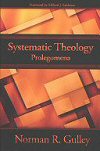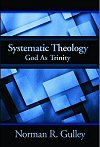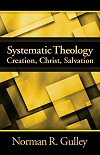Systematic Theology (3 vols.)
Digital Logos Edition
Overview
Adventist professor Norman R. Gulley’s three-volume Systematic Theology presents a sola scriptura view of the Christian faith. In his Prolegomena, Gulley presents an evangelical introduction to systematic theology and theological thought. He analyzes various denominations’ differing philosophies and shows how they have informed Christian thought throughout the centuries—both positively and negatively. His second and third volumes focus on the doctrines of God, Creation, salvation, and Christ. Gulley engages other theological views from the church fathers to the present day, answers critical questions, presents a diversity of perspectives, and defends his positions.

- Provides an evangelical systematic theology
- Contains study questions and introductory chapter summaries
- Engages differing theological views
- Addresses historical and contemporary theological issues
- Title: Systematic Theology
- Author: Norman R. Gulley
- Publisher: Andrews University Press
- Volumes: 3
- Pages: 2,460
- Systematic Theology, vol. 1: Prolegomena by Norman R. Gulley
- Systematic Theology, vol. 2: God as Trinity by Norman R. Gulley
- Systematic Theology, vol. 3: Creation, Christ, Salvation by Norman R. Gulley

What is the foundation of theology? In this monumental work—the “first things” of a multi-volume, comprehensive theological system—Norman R. Gulley argues pervasively and persuasively that Scripture must be the sole foundation of authentic evangelical Christian faith.
According to Gulley, theology should not depend on philosophy, science, reason, tradition, or experience, but on Scripture alone. His argument stands in contrast to recent influential evangelical theologians who consider Scripture only a witness to revelation, and not revelation itself. According to Gulley, God is thus removed from his Word in the same way others have removed him from his world. He argues that this emptying of Scripture of its propositional, cognitive revelation deconstructs the basis of the evangelical movement.
Gulley’s view of sola scriptura drives his detailed, sweeping, and balanced critique of the major underlying themes, issues, and philosophies that have informed some other theological systems. From Parmenides and the timeless view of God in ancient Greece to a detailed analysis of twenty-first-century dispensational theology, Gulley ranges easily over millennia, showing how different concepts and philosophies have affected the premise of sola scriptura for good or ill.
Aptly subtitled Prolegomena, this ambitious work functions as an excellent introduction to theological thought. It is designed for general use and for the serious student of theology who will appreciate the opening summary of each chapter’s contents, and the concluding study questions. It also serves as an introduction to the next volume which unfolds Gulley’s system within the biblical cosmic controversy worldview.
Norman Gulley’s Prolegomena is an encyclopedic introduction to systematic theology that is philosophically penetrating, historically informed, and biblically faithful. A compelling contribution to the scholarly study of the ‘queen of the sciences,’ it is particularly relevant to the challenges and opportunities presented by the postmodern world.
—Bruce Demarest, professor of Christian theology and spiritual formation, Denver Seminary
Norman Gulley’s Prolegomena is an outstanding contribution to the field of evangelical theology. . . . It is a wealth of information that will be extremely helpful for a new generation of theology students.
—David S. Dockery, president, Union University
This systematic theology is an impressive undertaking. Deeply rooted in the witness of Holy Scripture, it is richly textured by dialogue with current trends and contemporary thinkers. Norman Gulley writes as a theologian of the church and I commend his work to all God’s people everywhere.
—Timothy George, dean, Beeson Divinity School, Samford University
Dr. Gulley writes with conviction, yet expresses himself with serenity, as he surveys a wide body of knowledge concerning the Bible, revelation, and interpretation. Though conversant with the gamut of belief systems, he consistently upholds an evangelical position on these doctrines. He cites some of his denominational writings, but they are not prominent in his treatment. Gulley steers down the center lane of biblical inerrancy.
—James A. Borland, professor of philosophy and theology, Liberty University
Professor Gulley proposes as needed a theology that confronts postmodernity, not by accommodation but by setting forth a clear alternative. . . . Building on general revelation, on the Scriptures as revelation which is propositional, on the Bible as inerrant in the sense of ‘entirely trustworthy,’ on a strictly construed sola scriptura, and on a biblical hermeneutic recognizing authorial intent, divine as well as human, Gulley proposes. . . in evangelical theology for the postmodern era which is anchored in a soteriologically centered biblical worldview.
—James Leo Garrett Jr., distinguished professor of theology, Southwestern Baptist Theological Seminary

What is theology all about? In this long-awaited second volume of a multi-volume comprehensive theological system, Norman R. Gulley addresses the foundational question about theology: Who is God? The author starts with the premise that theology is, ultimately, about the essential character of God. What kind of God is he? Is he a good God or a bad one? Gulley’s biblical “cosmic controversy” worldview undergirds his answers to the most fundamental questions of what the Bible teaches about God.
Working steadfastly from the platform of sola scriptura established in his Prolegomena, Gulley takes the serious reader on a wide-ranging and insightful tour of the many facets of the doctrine of God. His approach first presents his biblical argument on a given topic, and then provides a helpful survey and summary critique of other views throughout the history of theological and philosophical thought.
Beginning with God as relational Trinity, Gulley addresses many other vital questions posed over time, including arguments about timelessness, immutability, and impassability; old and new covenants; God’s revelation through the biblical Sanctuary; His ultimate plan of mediation; redemption and restoration; process and openness theology; predestination; and other topics. As in the first volume, Gulley ranges easily over millennia in showing how different concepts and philosophies have affected our understanding of the character of God.
This ambitious work is designed for both the committed student of theology and the general reader who will appreciate each chapter’s opening summary, concise conclusion, and helpful set of study questions. This volume provides the fundamental basis of the rest of the system, and is a paradigm shift from many traditional views about God.
In this new work, Professor Gulley has carefully set forth his understanding of the doctrine of God by doing what the best theological writing does, namely, examining biblical theology as one develops systematic theology. I write as someone outside of the Adventist community and also one who holds to classic theism, but I believe that Dr. Gulley has provided to the Christian world a work that should be given careful consideration by all scholars committed to the authority of God’s Word. I am pleased to encourage the thoughtful reading of God as Trinity by evangelical scholarship, and look forward to further volumes from Professor Gulley.
—H. Wayne House, distinguished research professor of theology, law, and culture, Faith Evangelical College and Seminary
This is a major contribution to the field of systematic theology written by a respected and capable Adventist theologian. He takes us on a theological journey and exploration, from the time of the church fathers to our post-modern world, enriching our understanding of the history of this doctrine. At the center of his theological evaluative criteria he places the authoritative and formative role of Scripture. The volume is indeed a significant contribution to the fields of biblical, historical, and systematic theology. Students and pastors will be well-served by the study of this volume.
—Angel Manuel Rodriguez, director, Biblical Research Institute
This volume is truly a remarkable, landmark work. While employing the traditional loci of systematic theology—theology, anthropology, Christology—Norman Gulley breaks from the hoary tradition of nearly two millennia by constructing his theology according to the system of truth that arises from Scripture itself rather than from Greek dualistic philosophy. In this study one encounters a radical paradigm shift from the timeless God of Plato (underlying virtually all previous systematic theologies) to the biblical God who acts in time as revealed in the cosmic controversy biblical worldview and the sanctuary system inherent in Scripture. Each of the loci of this volume is meticulously grounded in Scripture, incorporating an impressive array of insights from the recent research of biblical scholarship. Gulley’s work is a ‘must read’ not only for systematic theologians, but for biblical theologians and exegetes, and all who are interested in grasping the inner coherence of Scripture.
—Richard M. Davidson, J. N. Andrews Professor of Old Testament Interpretation, Seventh-day Adventist Theological Seminary (SDA), Andrews University
A brilliant synthesis of biblical theology in light of historical and contemporary concerns. As this volume is thought-provoking from cover to cover, many will find much to commend and much to learn from. Essential, stimulating reading for biblical scholars and theologians-lucid and important also for thinking Christians of all faiths.
—Clinton Wahlen, associate director, Biblical Research Institute
Finally a systematic theology built on the sola-tota-prima scriptura principle. In this volume Norman Gulley replaces the timeless God of tradition with the historical God of Scripture. This paradigm shift in theological method places the Economic Trinity at the center of the inner historical logic of Christian theology, and recognizes the New Testament account of the ongoing controversy between Christ and Satan as the metaphysical framework of Christian theology. Readers will appreciate Norman Gulley’s irenic deconstruction of Christian tradition, his dialogue with a broad spectrum of leading theologians, and his biblical understanding of Christian doctrines. Fresh theological insights will stimulate the mind, and trenchant spiritual applications will challenge the heart of those who read this massive reassessment of Christian theology.
—Fernando L. Canale, professor of theology and philosophy, Seventh-day Adventist Theological Seminary (SDA), Andrews University

Is it all really about Christ? Yes, says Norman R. Gulley resoundingly, in this third volume of his Systematic Theology. In another sweeping and yet incisive evaluation of Christian theology, this time focusing on the doctrines of creation, Christ, and salvation, Gulley drives home his overarching theme that “Jesus Christ is the same yesterday and today and forever” (Heb. 13:8), which impacts creation and re-creation (salvation). If we give up the supernatural reality of creation, what right have we to accept the other supernatural events throughout Scripture?
This focus on Christ has profound implications for our understanding of origins and our relationship to the Word of God. As Gulley notes, “The written Word of God is as unchangeable and authentic as the living Word of God. Belief in supernatural creation is as important as belief in supernatural Incarnation and supernatural salvation.” For the biblically grounded Christian, it is impossible to accept the latter two without the first.
Thus, as Gulley says in the preface, this volume evaluates evolutionary theory as primarily a contemporary assumption that has led traditional theology to accept non-biblical ideas that are incompatible with the relational Trinity and with the biblical creation narrative.
As creation was in a specified time, so Christ came in time and in flesh as God’s revelation to humanity. The salvation he embodies for humanity occurs in time—in his life, his death, his resurrection and ascension, and his ministry now in the heavenly sanctuary. Throughout, as in the previous volumes, Gulley engages deeply and thoughtfully with other views on all these topics, and critiques them always against his basic credo of tota, prima, and sola scriptura.
In this third volume of his systematic theology project, Norman R. Gulley covers the doctrines of creation, Christ, and salvation with thorough attention to detail. Encyclopedic in scope, the author interacts with the history of scholarship, engages contemporary issues, and applies theological insights to ministerial contexts. Diversity of perspectives is represented but the author’s positions are asserted and defended with clarity and charity.
—Glenn R. Kreider, professor of theological studies, Dallas Theological Seminary
Norman Gulley’s Systematic Theology is a landmark study in Adventist theology. The doctrines of creation, Christ, and salvation—the three topics covered in this volume—are surveyed and analyzed against the backdrop of the great controversy between Christ and Satan. In the area of anthropology, the issue of creation and evolution receives extensive treatment, but it is on the doctrines of Christ and salvation that Gulley makes his most important contribution to Adventist theology. Apart from the extensive investigation of the biblical material, Gulley incorporates an impressive range of insights from the research of other scholars. His interaction with scholarly literature is exemplary. The book, although dealing with complex philosophical and theological matters, is easy to read and understand and should be in the library of every student of systematic theology.
—Gerhard Pfandl, associate director, Biblical Research Institute
Dr. Norman Gulley’s third volume on systematic theology devotes eight of its seventeen chapters to the relationship of biblical creation and science. His treatment emphasizes the importance of arguments that are logical, consistent, and biblical. Several important topics receive extensive treatment, including the creation days, human nature, the problem of evil, the nature of science, and the natural evidence relating to creation and the global flood. In the process, he shows the inadequacy of nonbiblical theories such as theistic evolution. Every scholar interested in the relationship of biblical creation and science will want to read this book.
—L. James Gibson, director, Geoscience Research Institute
Dr. Gulley has organized and analyzed a mass of material regarding important topics dealing with creation and evolution. Different points of view on these topics are compared and critiqued and he gives his judgment on what a biblically faithful interpretation will be. This significant work will certainly provide a basis for careful thought by those who agree with him and also those who do not agree.
—Leonard Brand, professor of biology and paleontology, Loma Linda University
Professor Norman Gulley’s third volume of his Systematic Theology is a magnum opus. It presents significant insights on creation, Christology, Pneumatology, hamartiology, and soteriology. He convincingly demonstrates how Christian theology is not only rooted in the biblical doctrine of Creation, but stands or falls on it. There is no place for theistic evolution. Dr. Gulley, with compelling reasons, argues that God, through Christ, provides the Atonement to solve the sin-problem, and to save those who respond to his prevenient grace. He argues for relational freedom. His sound exegetical principles, comprehensive approach, and profound biblical insights make this an excellent volume. Those wanting the latest research need this book. He presents a very insightful summary of the Protestant-Catholic dialogue on justification. Congratulations Professor Gulley for your outstanding theological masterpiece!
—Jirí Moskala, professor of Old Testament exegesis, Seventh-day Adventist Theological Seminary, Andrews University
Norman R. Gulley (Ph.D., University of Edinburgh, Scotland) is research professor of systematic theology at Southern Adventist University in Tennessee. He has worked in the Far East and in the United States during a long career of pastoring, teaching, academic administration, professional society involvement, writing, and extensive worldwide travel as a visiting lecturer. He has authored several books including Is the Majority Moral?, Christ Our Substitute, and Christ Is Coming! as well as more than 150 professional papers and popular articles on a wide range of issues in theology and practical religion. He is an active member of the Evangelical Theological Society and is a past president of the Adventist Theological Society.
Reviews
12 ratings

Zeke Vasquez
9/8/2021
Glad Adventist officially have a multivolume systematic theology! We've needed this for along time.

Jesame von Tronchin
9/14/2020
Josué Daniel Flores Guzman
12/21/2019
I am extremely grateful for these three volumes. But it seems to me that it is time to make the fourth volume available. When will it be available?
Shawn Smith
7/27/2018
I am waiting patiently for the 4th volume to come out, rather have it here in logos then the hardcopy. Please make it available asap.
Willian Oliveira
5/8/2017
When we can buy the fourth volume of the Systematic Theology: The Church and the Last Things?Benjamín
2/16/2017
Chris campos
10/28/2016
I'm on my second round through the 3 vols, awesome and so needed at this time in historyQuintin Betteridge
3/3/2016

Dewaine
7/19/2015